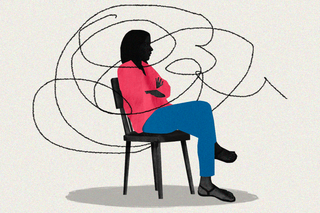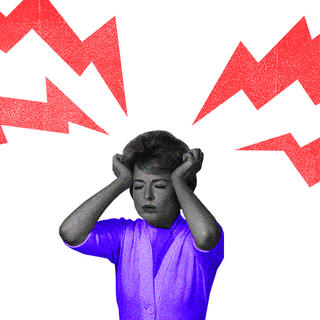
Why Holding Grudges Can be Emotionally Satisfying
Grudges reflect the human urge to regain control, demonstrate power, and validate ourselves.

People have described a grudge as a ghost of one’s past. Or a weight that pulls us down, with resentment and anger supporting its fire. There’s so much to be said about letting go than holding on. Holding grudges and writhing in resentment isn’t the healthiest of coping mechanisms, asthe common wisdom goes.
Yet, we grimace and harbor resentment towards people when we feel wronged. In the moment, angeris the only thing that matters. The emotional succor derived from grudges speaks to a human condition of yearning for control and validation.
Think of it this way: the feeling of being wronged can be hugely disempowering. A two-week-old fight with a friend, where some not-so-pleasant things were said, isn’t only about anger — it’s about unmet expectations. Any disbalance in this dynamic can be an emotionally fraught experience. Holding on to a grudge thusresponds to the human instinct to seek control and assert one’s power in the process.
“The really deep satisfaction comes from knowing that the person who harmed us has realized they wronged us, that they’re being punished, and they’re now going to change their ways,” said Michael McCullough, a professor of psychology at the University of Miami.
Another theory links biological processes with anideological one to answer why grudges so often are a defaultresponse. Grudges, experts note, are rooted in intense desire and craving. “Like other emotions, the capacity for hate and resentment are learned and reinforced over the course of our lives — but they’re also etched in the wiring of our DNA,” noted Gizmodo. “When we boil feelings of resentment and the desire for revenge down to the most basic level, they’re really about an evolved mental state that’s driving us to achieve some sort of goal.” It then also becomes a pursuit of validating our emotions, choices, and actions.
In other words, when we’re feuding with someone — over things borne with or without malice — there’s a craving to achieve one goal. The feeling of punishing someone or holding on to resentment is triggered by a response in our behavioral activation system — it is most likely due to the production of dopamine, and this is where our biological processes come into the picture. “This ancient brain system seems to produce this craving, and the sense that fulfillment is just around the corner. It’s not the seeking of pleasure or the reward itself, but rather the desire to move towards that goal,” said McCullough.
Related on The Swaddle:
Why We Enjoy Revenge Stories Much More Than Stories About Forgiveness
In some ways, we may not be programmed to “just let it go.” Our impulse is to react, to rage — instead of retrospecting our actions in real-time. In research conducted by McCullough, the ideas of resentment and revenge figured in 95% of the research material they collected from different societies. Humans, the theory is, have a propensity to stew when they are harmed; it is a “built-in feature,” so to say. While some note it may oncehave helped solve problems, that may not always be the case — at least, not anymore.
“It takes an unusually positive, optimistic, easygoing person to be able to just let it go. ‘Just letting it go’ is easier said than done because it leaves you holding the intense rage with no place to expel your aggressive impulses,” said Fran Walfish, a family and relationship psychotherapist. Grudges are satisfying because they are intuitive — it just comes naturally to us.
A corollary to this is also that ruminating over grudges — why we’re feeling a certain way — requires a lot of brainpower. In one experiment, researchers did an fMRI brain scan of participants while insulting them to see how their brain composition changes during bursts of anger. They were called after two weeks again to think about what they felt about those insults. In the first case, one region of the brain — the medial prefrontal cortex — lit up. In the latter case, when the participants reflected on their actions, different regions were activated — one linked to emotion and addiction, the other linked to memory, and so on. Grudges are complex notions to examine neurologically; they take emotional and mental labor. But in some ways, the dissection of these feelings feels physiologically harder.
The act of holding a grudge, some believe, is also linked to reinforcing a sense of identity. A person with a grudge is a person who is “wronged” — the role, intent, and actions are all clearly demarcated in this emotional game. We know who we are, and that can be a gratifying, certain feeling. “We have something that defines us — our anger and victimhood –which gives us a sense of solidness and purpose. We have a definition and a grievance that carries weight,” psychotherapist Nancy Colier noted. Colier adds this sense of purpose we find within ourselves also turns into compassion for the self — a raw emotion we were searching for in the first place.
Moreover, the act of resentment is also an act of self-preservation. Holding grudges, blaming an external person for unpleasant feelings, acts as a form of protection. This isn’t always a healthy process; experts note how the idea of “self-handicap,” where people find an outside source to place the blame on, can be detrimental to their own wellbeing.
But there’s room within this mishmash of anger and rancor for some growth. “I think grudges can be healthy in the sense that they can represent an invitation to examine your feelings toward someone,” says Rachel O’Neill, Ph.D., a licensed professional clinical counselor to TalkSpace.
“Revenge is the only debt paid promptly and with pleasure.” I’ve always liked this old chestnut — crisp, incisive, tumultuous.
Saumya Kalia is an Associate Editor at The Swaddle. Her journalism and writing explore issues of social justice, digital sub-cultures, media ecosystem, literature, and memory as they cut across socio-cultural periods. You can reach her at @Saumya_Kalia.
Related


How Stress Alters Brain Processes, Making People More Vulnerable to Disorders
